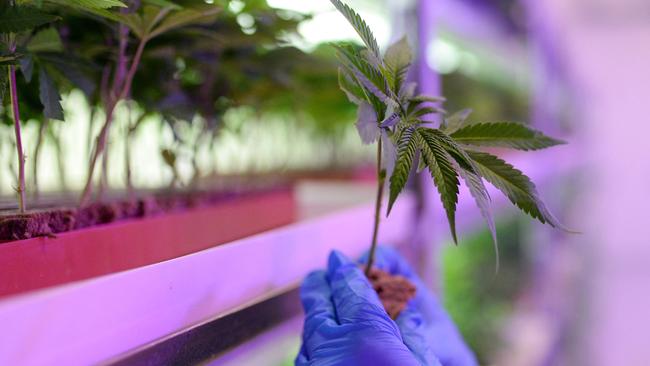Council’s plan to grow and sell cannabis
A council in Melbourne’s west has unveiled a plan to grow and sell medicinal cannabis to help boost its coffers. But the idea has some smoking mad.

Victoria
Don't miss out on the headlines from Victoria. Followed categories will be added to My News.
A Melbourne council is investigating a plan to grow, manufacture and sell medicinal cannabis to boost its coffers.
But the move by Maribyrnong City Council has been slammed by the ratepayers’ association, which warned local governments to leave the manufacturing of pharmaceuticals to scientists and concentrate on delivering for ratepayers.
The Medicinal Cannabis Industry Australia has also warned there is no quick and easy money to be made in the sector, cautioning it can take years to meet the strict Office of Drug Control requirements to gain a license and produce a suitable product.
Maribyrnong councillors will on Tuesday night vote on whether it should begin moves for the “establishment of an enterprise with the objective of cultivating, producing and manufacturing medicinal cannabis”.
The plan, put forward by Mayor Michael Clarke, is hoped to generate funding “as an alternative revenue stream to reduce over reliance on rate revenue”.
Although medical trials are continuing to determine which conditions can be treated with medicinal cannabis, Cr Clarke said the prospect of helping those with epilepsy, rheumatoid arthritis, cancer, pain relief and in palliative care meant there could be an export market.
“We have done an environmental scan here and it is really clear that in terms of opportunities, if we got into the medicinal cannabis industry, once it has blossomed it will give us a significant income stream,” Cr Clarke told the Herald Sun.
“We believe it will allow us to put a cap on rates and, going forward, reduce rates.
“It terms of growth possibilities are enormous.”
Ratepayers Victoria Association president Dean Hurlston said Maribyrnong’s medicinal cannabis plan was “ridiculous”.
“We are always looking for ways for council to innovative and responsible to lower the rates burden on residents, but this doesn’t pass the pub test,” Mr Hurlston said.
“Councils have no role in medicinal cannabis or any allied health service.
“Leave this to scientists and experts.
“Get the basics right — they are not some tech-science innovation company.”
Despite first approving medicinal cannabis in Australia and kickstarting the local cultivation industry, the Victorian Government has since stepped away to allow private industry to take over.
A Therapeutic Goods Administration spokesman on Monday reiterated the tight controls required to gain a cultivation or production license.
While in theory there is no limit to the number of licenses that can be granted, international conventions dictate that the overall quantities produced must not exceed domestic requirements - effectively capping the number of producers to only those with a demand from prescribers and the patient groups they treat.
MCIA chair Peter Crock more than 200 license applications had already been made to the Office of Drug Control, though the steps needed to satisfy the regulations were extremely strict.
“It is easy to say, hard to do,” Mr Crock said.
“It’s not instant cashflow in terms of providing product that meets the Australian requirements and good manufacturing practice.
“It is effectively a pharmaceutical product you are producing, and the path to patient in terms of providing it to doctors and their role in education and supplying the information behind it is a requirement as well.
“So it is not an instantaneous market. While there is a lot of interest in it, that doesn’t mean its an easy pathway to get to patients.”


